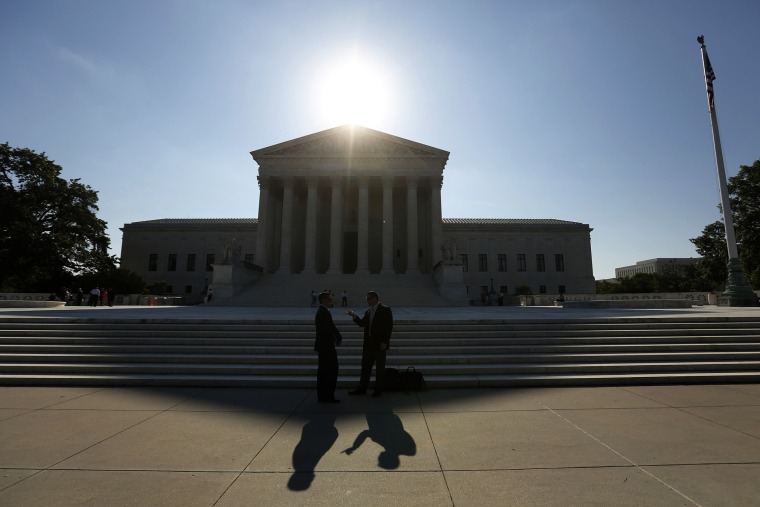Once again, the fate of gay and lesbian couples hoping to wed rests in the hands of the nation’s highest court.
With just over 24 hours to go until a ruling striking down Kansas’ same-sex marriage ban was due to take effect, Justice Sonia Sotomayor on Monday granted an emergency request for a stay from the state’s Republican Attorney General Derek Schmidt. The stay might not last long; Sotomayor, the justice assigned to the 10th Circuit (which has jurisdiction over Kansas,) granted the request “pending receipt of a response, due on or before Tuesday, November 11, 2014, by 5 p.m. ET.”
“She’s granted what sounds like a 24-hour stay,” said Tom Witt, executive director of Equality Kansas, to msnbc. “It’s real hard to say what’s going to happen next.”
A week ago, however, it would have been easy.
Related: "Marriage equality hit a speedbump, but will still get to where it’s going"
Following the Supreme Court’s decision last month to let stand three appeals court rulings in favor of marriage equality, U.S. District Judge Daniel Crabtree, a President Obama appointee, struck down Kansas’ same-sex marriage ban last Tuesday. Crabtree put his ruling on hold for a week to give Attorney General Schmidt time to appeal.
First, he filed for an emergency stay with the 10th Circuit Court of Appeals, which unsurprisingly turned him down. The 10th Circuit had already found same-sex marriage bans unconstitutional two times this year -- once in Utah, and another time in Oklahoma. Those rulings became final last month when the Supreme Court justices declined to review either case, as well as similar cases out of the 4th and 7th Circuits. Because of that action, marriage equality became the law of the land throughout the states where those cases originated – Indiana, Oklahoma, Utah, Virginia and Wisconsin – as well as throughout the other states with same-sex marriage bans that belong to the same circuits – Colorado, Kansas, North Carolina, South Carolina, West Virginia and Wyoming.
Given that the high court had cleared the way for marriage equality’s expansion to 11 more states, it seemed unlikely that the justices would be sympathetic to Schmidt’s appeal. But the game changed Thursday when the 6th Circuit Court of Appeals became the first in the nation to uphold same-sex marriage bans since the Defense of Marriage Act (DOMA) was struck down last year. That “circuit split” revived the chances that the Supreme Court would review a marriage equality case this session, and possibly issue another landmark decision for gay rights.
Kansas lawyers cited the 6th Circuit ruling five times in their stay application, according to the Associated Press, in an attempt to convince the justices that the issue was not yet settled nationally and should be put on hold until the high court rules. That logic has worked in the past, with the Supreme Court granting stays in similar cases out of Utah and Virginia.
Clerks offices were scheduled to close Tuesday for Veterans Day, so the big question is whether same-sex couples can begin applying for marriage licenses on Wednesday. Earlier in the day, Tom Witt advised gay and lesbian couples to rush to the altar as soon as possible.
“If you want to get married, get married. That’s really what I’m telling people,” Witt said. “There’s so much back and forth. We’ve had one couple get legally married in the state before, and the attorney general shut it down. Who knows where this is going to go next?”
